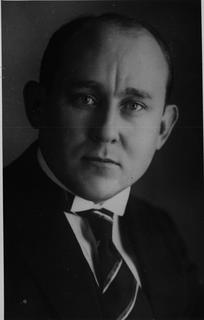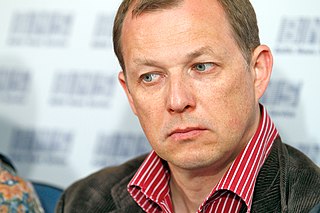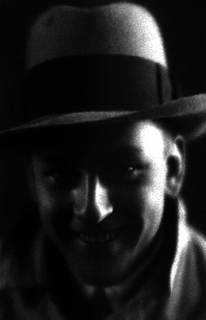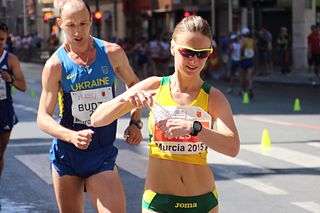 W
WVytautas Alantas was a Lithuanian writer, journalist, and political ideologue. Educated in France, Alantas worked as a journalist of the Lithuanian news agency ELTA and chief editor of the official daily Lietuvos aidas. Alantas was one of the leaders of Young Tautininkai, an organization of radical young members of the Lithuanian Nationalist Union in the late 1930s – this movement is also known as Vairininkai after the political magazine Vairas. A sympathizer with national socialism, Alantas is considered to be one of the chief ideologues of totalitarian nationalism in interwar Lithuania. During the Nazi occupation of Lithuania, he participated in the Lithuanian Activist Front (LAF) and later emigrated to the United States where he dedicated his life to literary work. He was a prolific writer and published seven collections of short stories, six novels, fifteen plays, four non-fiction books, and one poetry collection. His writings primarily deal with patriotic themes and topics.
 W
WMagdalena Avietėnaitė was a Lithuanian journalist, diplomat and a public figure.
 W
WKazys Binkis was a Lithuanian poet, journalist, and playwright. He used the pseudonyms K. Alijošius, K. Papilietis, Kazys, Kazys Roviejietis, Nedarbininkas, Neklaipėdietis, Nelatvis, Nepartyvis, Ras Desta, Riza Chanas, and others.
 W
WLeonas Bistras was one of the most prominent Lithuanian politicians of the interwar period. A Christian Democrat, he rose to the peak of his career in 1925, when he was appointed as the Prime Minister of Lithuania. Bistras also headed the ministries of education, defense and foreign affairs in several different governments throughout 1920s and 1930s and twice served as the speaker of the Lithuanian parliament, the Seimas. After the 1926 Lithuanian coup d'état and the subsequent fall of parliamentary democracy, Bistras led the Christian Democrats and, despite persecution, acted as an outspoken leader of the opposition to the authoritarian President Antanas Smetona.
 W
WBernardas Fridmanas or Bernard Naftal Friedman was a Lithuanian Jewish lawyer, judge, journalist, politician and an activist of the Jewish minority. He served as the Minister of Jewish Affairs for Lithuania in 1923.
 W
WLiudvikas Jakavičius was a writer, journalist, publisher, theatre director, banker and nobleman. He was born in Akmenė (Lithuania) and died in Anykščiai (Lithuania).
 W
WČeslovas Juršėnas is a Lithuanian politician and a former Speaker of the Seimas, the Lithuanian parliament.
 W
WButkų Juzė was the pen name of Juozas Butkus, a Lithuanian educator, poet, playwright and journalist. He worked for numerous newspapers from 1910 onwards, including Aušrinė, Žemaitis, Lietuvos žinios, and Naujojoje Lietuvoje. In 1932 he was inducted into the Lithuanian Journalists' Union. He wrote the play Palaidūnas (Prodigal) in 1925, and translated numerous works into Lithuanian, including Goethe's Egmont. He later worked as a museum curator and teacher at the Klaipėda Pedagogical Institute.
 W
WVytautas V. Landsbergis : Lithuanian writer, journalist, director of films and theater, children's book writer, son of Vytautas Landsbergis and father of Gabrielius Landsbergis.
 W
WVytautas Antanas Matulevičius is a Lithuanian journalist, publicist, political figure and a former member of the Seimas.
 W
WVladas Mikėnas was a Lithuanian chess player and journalist. He was awarded the titles of International Master and Honorary Grandmaster by FIDE.
 W
WAntanas Paškevičius – Poška was a prominent Lithuanian traveler and anthropologist, as well as an active member of the Esperanto movement in Lithuania. He is best known for his journey to India in 1929–36. In India, he studied Sanskrit and received bachelor's degree in anthropology from the University of Bombay and wrote his PhD thesis at the University of Calcutta on the Shina-speaking people but was unable to defend it. He interacted with India's intellectual elite and participated in anthropological expeditions. He met with Rabindranath Tagore and translated some of his works into Lithuanian. Poška returned to Lithuania in 1936 and worked as a journalist. He was recognized as the Righteous Among the Nations for hiding three Lithuanian Jews during the Holocaust in Lithuania. After the Soviet takeover in 1945, he refused to destroy books deemed unacceptable to the Soviet regime and was imprisoned in a Gulag. Unable to return to Lithuania, Poška later worked at several museums in Central Asia. He was allowed to return to Lithuania in 1959 and worked as a lecturer and journalist and continued his anthropological studies, but his past as a political prisoner prevented him from taking a more prominent position. By age 60, he had visited 75 countries and 120 nations. Poška was a prolific writer contributing articles to Lithuanian and foreign press. His bibliography, published in 2006, has 3,756 entries, but his main work, the eight-volume Nuo Baltijos iki Bengalijos on his experiences in India, was published only in 2002–12, a decade after his death.
 W
WJuozas Purickis was a prominent diplomat and journalist in interwar Lithuania and served as the Minister of Foreign Affairs from June 1920 to December 1921.
 W
WMatas Šalčius was a Lithuanian traveler, journalist, writer, political figure.
 W
WJokūbas Šernas pronunciation (help·info) was a Lithuanian attorney, journalist, teacher and banker, one of the twenty signatories to the Act of Independence of Lithuania.
 W
WMykolas Sleževičius was a Lithuanian lawyer, political and cultural figure, and journalist. One of the most influential figures in inter-war Lithuania, he served as the prime minister of Lithuania on three occasions. Taking the helm of the government at a difficult time in 1918 and again in 1919, Sleževičius has been credited with preparing Lithuania for the fights to come and for laying the foundations of the fledgling state.
 W
WBrigita Virbalytė-Dimšienė is a female professional race walker who competes internationally for Lithuania. She participated at the 2009 World Championships in Athletics and reached 24th place. She is also a Lithuanian National Radio and Television sports journalist. In 2010, she became national champion at the Druskininkai 10 km walking event, winning in a personal best of 44:42 minutes.
 W
WPovilas Višinskis was a Lithuanian cultural and political activist during the Lithuanian National Revival. He is best remembered as a mentor of literary talent. He discovered Julija Žymantienė (Žemaitė) and advised Marija Pečkauskaitė, Sofija Pšibiliauskienė, Gabrielė Petkevičaitė (Bitė), Jonas Biliūnas, Jonas Krikščiūnas (Jovaras), helping them edit and publish their first works.
 W
WRytis Zemkauskas is a journalist, a writer, a broadcaster and a film director.